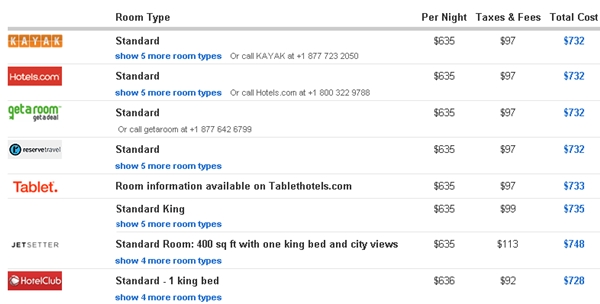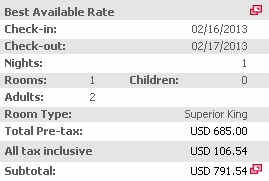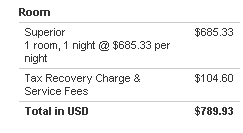
I got a reader email asking my thoughts on the recent class action lawsuits filed against Expedia, Orbitz, Travelocity, Marriott, Starwood, InterContinental, Hilton and other major online travel agencies (OTAs) and hotel chains. So far two actions have been filed: Turik et al v. Expedia Inc. et al in the U.S. District Court, Northern District of California, and a more recent case by James Smith against the same group of defendants in the Northern District of Texas. So what is price fixing, is it illegal, why should you care, and how do you avoid overpaying for hotel rooms? Here are my thoughts.
What's Price Fixing?
Price fixing, or the specific version of it in these complaints, Resale Price Management (RPM) occurs when companies at different stages of the distribution chain agree on a certain maximum or minimum price that can be charged by resellers to their customers.
Is Price Fixing Illegal?
Prior to June 28, 2007, RPM was according to federal law per se illegal, meaning that there were no circumstances that could mitigate a finding of illegality, if it was found to occur. But on June 28, 2007, the Supreme Court held that minimum RPM agreements were no longer illegal. Instead, they became subject to a Rule of Reason test that weighs the procompetitive benefits of such an agreement against the anticompetitive harm to consumers.
That said, some states, including California, still consider any kind of RPM agreement per se illegal and in violation of state antitrust laws.
How About an Example? What are These Cases Really About?
In both cases, the plaintiffs are alleging that Expedia, Orbitz, and other major OTAs made agreeements with the hotel chains to not do business with any online travel sellers that sold rooms below certain prices, resulting in higher prices to consumers.
You might ask, why would the hotel chains agree to something that in effect ties their hands in terms of not allowing them to sell their rooms more cheaply via other channels? The answer is that the major OTAs are such a vital piece of these hotels' distribution platforms that even the largest hotel chains need to agree to these terms. There are very few hotels that willingly opt out of any kind of OTA distribution, due to the wide market reach. And hotels that don't play by OTA rules–for example, give a lower price to one OTA or another distribution partner–can find their hotels penalized by the other OTAs' search results, meaning fewer bookings from those channels.
Why Should You Care?
Two words: lower prices. Now, these particular cases, regardless of their outcome, will probably benefit the lawyers most, and not result in any kind of huge payout for the actual plaintiffs. But the cases are worth watching (as well as events unfolding in the UK, where the UK regulator has alleged Expedia, Booking.com and InterContinental entered into agreements that restricted the OTAs' ability to discount room-only bookings) is that a change in the status quo would mean a huge shake-up in the industry and pricing. There's disagreement, though, on what the changes will actually be. Many assume that eliminating RPM would enable startups to better compete, as they could undercut the existing artificially high prices. On the other hand, even if this is initially true, it could prompt a race to the bottom as OTAs, who have huge sway, negotiate better deals than smaller players are able to, then cut margins for awhile to force out smaller players before jacking prices up again.
I do think that it would promote healthier competition and result in lower prices if RPM was considered per se illegal, but of course Expedia and the other OTAs will continue to wield enormous clout, especially against smaller chains and independent hotels.
How to Avoid Overpaying for Hotel Rooms?
Budget Hotels: Priceline/Hotwire
Your strategy will depend on the type of hotel you're looking for. Certainly, if you're after the cheapest possible room for 2, 3, and some 4 star hotels and aren't picky about where you stay (or are willing to put in a lot of time crossreferencing with Hotwire, etc. to figure out the likely property) you can simply use Priceline's Name Your Price. You can pretty easily get around the restriction on number of bids for higher category hotels by including additional neighborhoods where you know there aren't any of the same star category hotel.
For luxury properties, you have a few choices:
Free Nights via Credit Cards
Ok, in reality you generally have an annual fee that isn't waived, but these are still amazing deals if you use the bonus points or nights correctly. My favorites:
1. Hyatt Visa – 2 Award Nights at any Hyatt, including Park Hyatts
This includes properties such as the Park Hyatt Maldvies, where “standard rooms” or rather, villas, are often $1000 or more per night.
2. Marriott Rewards Premier Card – 50,000 Marriott points
This is enough for a night at any Ritz-Carlton Tier 1-3 property. There are also some higher targeted offers, so make sure to open your Marriott mail, especially if you have elite status but don't yet have this card.
3. Fairmont Visa Signature Card – 2 Nights Including Breakfast
I'm not as fond of this card as the Hyatt Visa, due to the $1000 minimum spend and the fact that I'll always pick a Park Hyatt over even high end Fairmont hotels, but 2 free nights is still nothing to sneeze at. See our Fairmont Visa Signature Card Review
Miles and Points
You can still “overpay” with points, even with SPG Cash & Points redemptions, so you'll want to check the hotel's retail price and compare that to how you value the points you're using. See these posts:
How Much Are Hotel Points Worth?
Best Ways to Use Starwood Preferred Guest Points
When Is It Worth It to Buy Starpoints?
Private Sale
It's certainly possible to grab some great deals from Jetsetter, Voyage Prive, etc., although often not terribly convenient since the deals they have at any given point in time may not match the trip you're planning, or the future availability may not work. And don't forget these are all entirely non-refundable reservations–you're out of luck if you need to change or cancel.
TravelSort
TravelSort is truly your best bet for getting wholesale rates on luxury properties. Here's an example of a property I've booked under a TravelSort rate in Q1 2013, for $459 including tax for a Superior Room. The hotel rate for the same room and date is $791.

The rates at Kayak, Hotels.com, and several other providers are all $789, and other providers such as Jetsetter are even more expensive.

Thanks to TravelSort, you'd save $330 over the cheapest rate you could get elsewhere.
Virtuoso
If you like hotel packages that include breakfast, a potential upgrade, and perhaps a spa treatment or afternoon tea, Virtuoso can be perfect for you. I never book these rates, since they're generally the same rate as the hotel's (so more expensive than TravelSort rates) and I usually prefer to try local food at the destination and find my own breakfast. As for an upgrade, I almost never fail to get one even with TravelSort or industry rates; check out Top 17 Hotel Upgrade Tips
Check out and apply for the Best Travel Credit Cards.
If you enjoyed this, please follow TravelSort on Twitter or like us on Facebook to be alerted to new posts.
Become a Member to find your perfect luxury or boutique hotel at up to 50% off: TravelSort Hotels